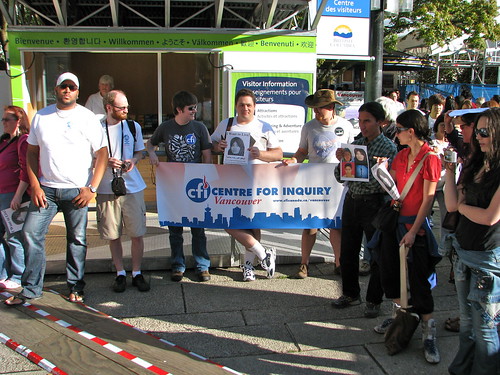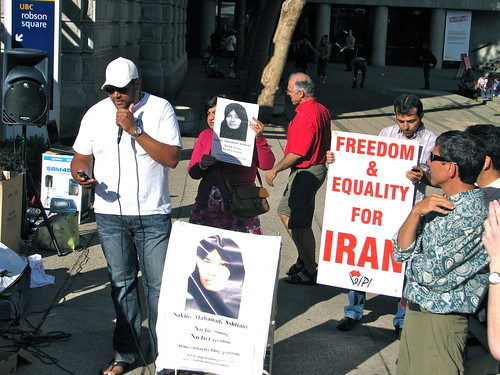Despite the fact that it is against the rules, I have cross-posted this piece on Canadian Atheist.
Most of you are probably unaware that I occasionally contribute to the group blog Canadian Atheist. This is a site with contributors from all around the country, discussing various activities and issues within the atheist community, with particular relevance to Canada. The authors, myself among them, are all young people from various walks of life (although predominantly students). The discussions are usually interesting, but most of the time I end up bashing my head against my keyboard and screaming. As I’ve often said I have no problem with people disagreeing with my positions – I am happy to admit that I don’t know everything and am overjoyed when someone approaches me with a cogent, well-reasoned refutation of a position I hold. I am married to exactly none of my ideas, except insofar as nobody likes to be told that they’re wrong.
The thing that frustrates me is when the opposing position is completely brainless:
I know this is going to sound like a bit of a rant, but an idea just occurred to me. I’ve noticed that atheists, quite frequently, have sour dispositions. They’re often stand-offish, critical, and unfriendly. I notice they are also quite frequently socially awkward, but that’s a different issue to tackle.
Crap. Crap crap crappity crap crap.
We need to work on our image. I’m not sure where to start, but perhaps approaching the problem from the ground up is a nice way to start tackling the issue. What I would suggest is for atheists everywhere to be a little more friendly to not only one another, but also to others outside their atheist circle of friends.
Depressingly crappy craptacular crap.
The point is that the great atheist leaders that many atheists regard so highly are often viewed by outsiders as extreme, unreasonable, and ridiculous. Even those who agree with our cause often feel this way. Which means that if we’re trying to get the public on-board with our ideas and opinions, we’re failing.
Unadulterated, pure, unprocessed, certified organic CRAP.
All of this crap, brought to you in this particular case by fellow CA author Brent Kelly, is in reference to an argument that I’ve talked about a few times, the virtue of confrontational atheism. My position, boiled down, is that there absolutely must be people who are not afraid to stand up and make their opinions clear, regardless of if those in the majority get their feelings hurt in the process. Some things are more important than feelings, and I would offer human rights and the future of our society among those things.
But the issue at stake here (in this steaming pile of crap) is not simply whether or not “firebrands” are right or wrong, it’s the complete lie that is painted about atheists. There’s this ridiculous caricature that has been cultivated by believers that atheists are these angry, bitter, misfits who rail against religion and foam at the mouth whenever anyone has the temerity to say “bless you” when someone sneezes. Before I knew anything about Richard Dawkins, for example, I knew that he was a smug, arrogant prick with a bug up his ass about God. Of course, once I actually bothered to read any of his stuff and watch him in debate, I found out that he was a nebbish British biology professor with a soft spot for literature.
It’s a lie. It’s all of it a lie. Atheists absolutely do not have sour dispositions, any more than the rest of the population. We are not stand-offish or unfriendly in the least. Saying that we are critical is a fair charge, since criticism is part and parcel with skepticism, and the two camps share close ties. As far as being socially awkward goes… Brent, I say this with great affection, but go fuck yourself sideways with a rusty spike. At this point, you’ve completely abandoned any kind of critical thinking and have just wholeheartedly embraced the same kind of ridiculous stereotyping that is enjoyed by anti-gay bigots and racists.
I know this is going to sound like a bit of a rant, but an idea just occurred to me. I’ve noticed that blacks, quite frequently, have lazy dispositions. They’re often stupid, apathetic, and superstitious. I notice they are also quite frequently criminals, but that’s a different issue to tackle.
I know this is going to sound like a bit of a rant, but an idea just occurred to me. I’ve noticed that gay men, quite frequently, have effeminate dispositions. They’re often hyper-sexualized, promiscuous, and over-the-top. I notice they are also quite frequently HIV positive, but that’s a different issue to tackle.
This is the level of criticism we’re dealing with here. The kind of criticism that is happy to abandon any reasoned investigation into why black people are imprisoned at higher rates than whites, or why gay men have higher rates of HIV, and instead chalk it up to some kind of dispositional issue. It then becomes the job of the stereotyped group to fix the problem:
And be open to their ideas too, you might even learn something. Do whatever, just don’t get into a shouting match and reinforce the stereotype that atheists are argumentative, unfriendly, and annoying.
Cee Are Eh Pee – CRAP.
The completely false picture of atheists, or blacks, or gay people, or communists, or secularists, liberals, immigrants, etc. etc. etc. is one that is always based on an intentional mischaracterization of that group, from a position of privilege enjoyed by the majority group. Whenever someone disagrees with the majority position, if the argument can’t be defeated on its own merits, the next step is to demonize the minority group based on stereotypes – “It seems to me that many of group X is like this…” Since the majority have never come in contact with a member of the minority, they’re happy to buy into the idea that these people fit the stereotype. The lie then makes its way into the public conscience, becoming more and more popular, until members of the minority can’t even speak up on their issues without someone tagging them with completely false attributions. The member of the minority group then has to spend her/his time fighting against a lie rather than dealing with the real issues.
The most frustrating part of all of this is when it comes from within the minority group itself. When we’re not fighting against bigotry coming from those who oppose us, but from those who are supposed to be our allies – happy to throw us under the bus in the name of appeasing the completely fraudulent stereotype of members of the majority who just want to be left alone.
Utter, elemental, pure mountain springs of crap.
TL/DR: Atheists are angry because people keep spreading lies about us. It is a stereotype with no basis in fact. I have no patience for other atheists who tell us that it’s our fault that we’re stereotyped by liars.
Like this article? Follow me on Twitter!
Brent posted a response to this rebuttal later that day. As I predicted, it’s nothing more than a butthurt whine that being upset about being slandered is “proof” that the stereotype is true, coupled with goalpost shifting – “I was just saying we should explore whether it’s true or not.” Of course, 1100+ word post was largely ignored because there were some bad words in it. Also, stereotypes must have some truth, otherwise why would people believe them? In between sarcastic comments, Brent tells me that he’s just super busy right now, and therefore can’t respond to any of the multitude of criticisms, or takes a faux-principled stand and says he won’t address any issues that feel like a personal attack. Words cannot express how unimpressed I am.







